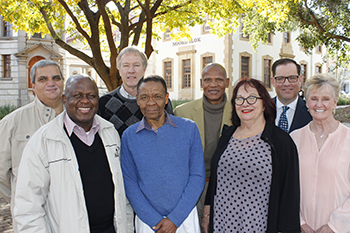Latest News Archive
Please select Category, Year, and then Month to display items
12 October 2020
|
Story Arina Engelbrecht
|
Photo Supplied
 Arina Engelbrecht from Organisational Development and Employee Well-being believes physical activity has a number of benefits for one’s health, including stress relief.
Arina Engelbrecht from Organisational Development and Employee Well-being believes physical activity has a number of benefits for one’s health, including stress relief.
Being physically active plays a big role in preventing the development of mental-health problems and in improving the quality of life of people experiencing mental-health problems.
Treatment for depression
Physical activity can be an alternative treatment for depression. It can be used as a stand-alone treatment or in combination with medication and/or psychological therapy. It promotes all kinds of changes in the brain, including neural growth, reduced inflammation, and new activity patterns are formed that promote feelings of calm and well-being. It releases endorphins – powerful chemicals in the brain that energise your spirit and make you feel good.
Physical activity can be very effective in relieving stress. Research in adults has found that physically active individuals tend to have lower stress levels compared to individuals who are less active. It also leads to improved sleep. When a person sleeps better and feels more rested, overall quality of life improves. They cope better with daily life stressors.
Reduce Alzheimer's risk
Regular physical activity can reduce your risk of developing Alzheimer's disease by up to 50%. It can also slow down further deterioration in those who have already started to develop cognitive problems. It stimulates the brain’s ability to maintain old connections as well as to make new ones.
A study asked people to rate their mood immediately after periods of physical activity (e.g. going for a walk/run, cycling, doing housework) and periods of inactivity (e.g. reading a book or watching television). Researchers found that participants felt more content, more awake, and calmer after being physically active compared to after periods of inactivity.
In conclusion, people who are physically active feel a sense of well-being, feel more energetic throughout the day, sleep better at night, have sharper memories, and feel more relaxed and positive about themselves and their lives.
“Being physically active not only changes your body, it changes your mind,
attitude, and your mood.” – Arina Engelbrecht
South Campus first in SA to introduce new online platform for educators
2016-05-25

Dr Whitty Green (DHET), Phillip Dikgomo (NDBE), Ernst Stals (Free State Department of Education), Isaac Mogotsi (Nothern Cape Department of Education), Tsatsi Montso (Free State Department of Education), Prof Daniella Coetzee (Principal: South Campus), Steven Bailey (Academic Partnerships), and Prof Judy Zimny (Academic Partnerships)
Photo: Eugene Seegers |
The South Campus of the University of the Free State (UFS) has become the first in South Africa to introduce a completely online platform for educators to obtain the Advanced Certificate in Teaching (ACT) in either Foundation, Intermediate, or Senior Phase.
Beginning with the first start date of 4 July 2016, this platform will be offered in nine or ten 8-week sessions. It will provide educators the opportunity to complete these certificates in 18-20 months compared to the 24 months usually required by part-time university students. Academic and technological support will also be provided.
Unique platform
Prof Daniella Coetzee, Principal of South Campus, said that she is thrilled, “as this opportunity for educators to earn a qualification 100% online - is a first for both the UFS and South Africa.” This opportunity represents tremendous strides in providing options for South African educators.
According to Prof Jonathan Jansen, Vice-Chancellor and Rector of the UFS, human connectivity is a key component of education: “We should never reduce education to a stranger at a distance without any human interaction. That is also why the UFS has been consistent in promoting not only its Academic Project, but the Human Project as well.” He said that it would not be possible to extend second-chance opportunities to students without partnerships with government, non-profit organisations, local and international academic partners, and other external stakeholders.
Specific challenges addressed
In her presentation, Prof Judy Zimny, who is affiliated with Academic Partnerships (a company that has supported more than 40 universities in providing high-quality online programmes for educators) aligned a number of the challenges described by South African leaders in supporting educators with opportunities now available through online education as a result of recent strides in learning technologies.
Various members of the national education sector were also present at the workshop to give their input: Isaac Mogotsi (Northern Cape Department of Education), Phillip Dikgomo (National Department of Basic Education - NDBE), Dr Whitty Green (Department of Higher Education and Training - DHET), Tsatsi Montso (Free State Department of Education), and Ernst Stals (Free State Department of Education).
For educators interested in pursuing an Advanced Teaching Certificate (ACT), the website will soon be populated with all admission and enrolment information for programmes starting on 4 July 2016, 29 August 2016, and 24 October 2016.